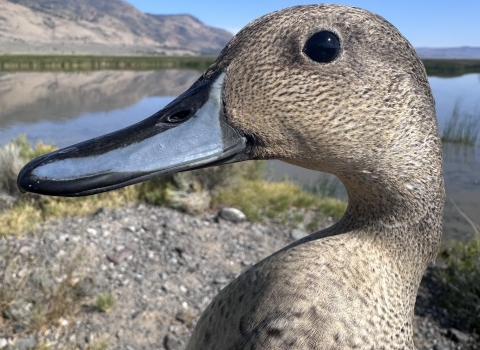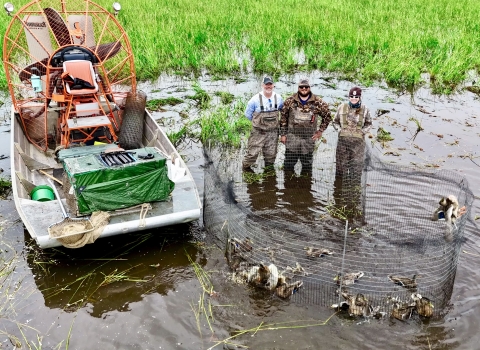“There is going to be many struggles and big decisions you will need to make, so make the best ones for you and don’t let others talk you into doing something for the wrong reasons. Find that special someone in your life who will be there during the good and hard times. It does not need to be a partner, it can be a friend, family member, or mentor, and it does not have to be the same person throughout your entire career. Never stop asking questions and learning something new every day.” Senior Special Agent Lizz Darling.
What is your primary work focus?
I have been a special agent since 2004 but have been with the Service since 1996. I currently work under the Special Operations Division, International Operations Unit (IOU) at Headquarters in Falls Church, Virginia. Within the IOU, I work closely with the Service’s attachés on budgeting, operational needs, policies, joint international investigations with the field, information sharing between the Service and our foreign counterparts, team building, training, and more. I also assist the on-going international wildlife trafficking investigations with search warrants, grand jury subpoena requests and review, interviews, and strategies.
Why do you believe your job makes a positive difference?
I know my job makes a positive difference when I meet people who are my equivalent in other countries, such as in Africa and Asia, and who want to build partnerships with the Service. These partnerships open up many avenues of information sharing, training, joint investigations, and friendships. I value those friendships, not only because we have the same passion for wildlife, but we understand how working together can make the struggle of fighting wildlife trafficking a bit easier.
What was your career path that brought you to the Service?
When I graduated from college in 1995, I was not sure where my career path was going, other than I knew I was going to work for a conservation or wildlife agency, so I sent my résumé to several state and federal agencies. In early 1996, I received a call from the Service asking if I would like a temporary biology technician position at the National Eagle and Wildlife Property Repository. I had no clue what that was or what they did but said yes! I worked at the Repository for a year and then was permanently hired as a repository specialist. For five years and through that position, I met and worked with wildlife inspectors and special agents and I knew I wanted to take my career further into the law enforcement side. It took me a couple of years to attain, but in 2002, I was hired as a wildlife inspector and was stationed in San Diego, California. I worked in San Diego for almost two years when I was hired as a special agent. In 2004 and after six months of training, I went out to my field station in Los Angeles, where I worked for a year.
Los Angeles is a great location for new agents due to the diversity of wildlife investigations and activities. In 2006, I was stationed in Las Vegas, Nevada. During the first three years in Nevada, I worked with one of my greatest mentors in my career. He not only treated me like I could do anything I set my mind to, he also started to teach me how to be comfortable working covert investigations, performing interviews, and doing field work, all of which led to establishing a great working relationship with the Nevada Department of Wildlife. In 2010, I was hired by the Special Investigations Unit (SIU), formally Special Operations, and moved back to Colorado. I worked international wildlife trafficking investigations for almost 10 years and in mid-2019, I decided to take a lateral move to OLE Headquarters to work in the IOU, where I currently am stationed.
What are you most proud of?
I am proud of being the first one in my family to finish college with a degree and being one of the first females in the SIU - currently, there have only been four females agents to work in the SIU.
What advice would you give to a young woman who is thinking about pursuing a career in wildlife law enforcement?
There is going to be many struggles and big decisions you will need to make, so make the best ones for you and don’t let others talk you into doing something for the wrong reasons. As for the struggles, find that someone in your life who will be there for you during the good and hard times. It does not need to be a partner, it can be a friend, family member, or mentor, and it does not have to be the same person throughout your entire career - just so you have someone to get you through those times when you feel like you just want to quit.
How does the danger of your job affect your loved ones?
Early on in my career, I didn’t really notice how it affected my family, but as I get older, it has become more obvious. It is not necessarily the danger that I may be going into, but the affect it has had on me through the years. Law enforcement if a stressful job and when you get used to the high stress situations, the high excitement or adrenaline rush becomes a “need” to make you feel whole. People around you can suffer because they can’t understand that need and for most law enforcement officers, they cannot express why they need it either. There are some very helpful books that explain this process and how to help you and your family get through it.
What challenges did you overcome to get where you are today?
I am not sure the word “overcome” describes what has to be done with some of the challenges; I feel it is more like, “push through,” because some of the challenges do not go away, you just have to keep pushing through them over and over. I have a passion for what I do in my career and there have been those that have seen this as “too emotional” and it has been seen as a weakness. I do not believe having emotions and speaking your truth is a weakness, you cannot go through life not feeling or being affected by what is happening around you, it causes you to become jaded and complacent.
- Written by Senior Special Agent Lizz Darling




